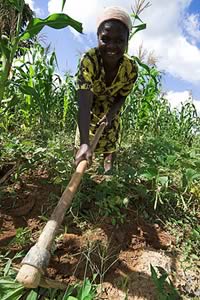 |
|||||||||
|
|||||||||||||||||||
|
|
Agri-Gender Database to Assist Rural Development A new FAO toolkit aims to sharpen the focus of anti-hunger and development efforts by helping countries gather more accurate information on differences between men and women in agriculture.
The Agri-Gender Database, developed in response to a request from the African Commission on Agricultural Statistics (AFCAS), offers step-by-step, example-driven guidance on how to collect gender statistics, or sex-disaggregated data, in agriculture. It is designed for a wide range of users who influence development planning, from agricultural statisticians and researchers to policy planners and gender advocates. "Gathering statistics on how women differ from men in the nature of their agricultural work - and on other issues like their access to resources and exposure to food insecurity - is essential to improving the planning and sustainability of development policies and programmes," said Diana Tempelman, FAO Senior Officer for Gender and Development. "With more specific information, policy-makers can provide greater support to those who lack access to and control over agricultural resources and help women to achieve greater equality and food security," Tempelman said. "But users and producers of agricultural statistics have noted that the information compiled often does not reflect the actual roles and responsibilities of women in agricultural production." The methodology for gathering such information, as illustrated in the toolkit, was developed over two decades of research and direct work on census surveys in numerous countries in Africa. "Very often, when people look for gender-related data, they look for it in relation to social issues, education, health, and legal aspects of people's lives. Very rarely do they think of agricultural statistics-gathering as a tool for collecting gender data. The Agri-Gender Database will help them in this regard," says Tempelman. The first edition of the toolkit includes examples of gender-relevant questions and table formats used in agricultural censuses in fifteen African countries between 1993 and 2006. The database covers topics like agricultural population and households, access to resources, production and productivity, labour and time use, the destination of agricultural produce, income and expenditures, membership in farmer organizations and indicators for food security and poverty.
Asking the right questions The contribution of women and girls to agricultural production is often underreported because data on much of what they produce is obtained from records of land holdings, which are formally headed by men. One of the key changes in data-gathering advocated by the Agri-Gender Database is the use of information gathered not only according to each land holding or household, but as reported by males and females within each household. The majority of women involved in agriculture - around 80 percent - work in households headed by males. Data collected in Tanzania revealed how the use of financial resources for purchasing agricultural supplies tends to differ between male-headed households and female-headed households. "Female-headed households use whatever little credit is available for labour or seeds, which may leave you only at the current level of productivity. It may increase production, but not necessarily productivity. Males, instead, are more likely to buy fertilizer or agro-chemicals, which are productivity-enhancing inputs." This kind of information could enable planners to tailor their efforts to support those who lack access to adequate productive resources.
|
||||||||||||||||||

|
|
||||||||||||||||||
| home | agri-services | pedigree
pen | news | dairy | beef | machinery property | organisations | site map |
|||||||||||||||||||

